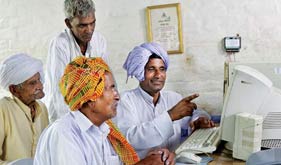 Strengthening Rural Livelihoods Strengthening Rural Livelihoods
| e-Choupal: A Path-breaking Initiative that Empowers the Farmer |
 The e-Choupal initiative revolutionised the Indian agricultural landscape by leveraging digital technology and customised extension services to empower farmers and raise rural incomes. By providing the power of Information and Digital Technology, small and marginal farmers are empowered with a host of services related to knowhow, best practices, timely and relevant weather information, transparent discovery of prices and much more. The e-Choupal network not only connects farmers to markets, but also allows for virtual integration of the supply chain, to create significant efficiencies in the traditional system. The e-Choupal initiative revolutionised the Indian agricultural landscape by leveraging digital technology and customised extension services to empower farmers and raise rural incomes. By providing the power of Information and Digital Technology, small and marginal farmers are empowered with a host of services related to knowhow, best practices, timely and relevant weather information, transparent discovery of prices and much more. The e-Choupal network not only connects farmers to markets, but also allows for virtual integration of the supply chain, to create significant efficiencies in the traditional system.
A business concept embedded with social goals, e-Choupal has been designed to benefit farmers by enabling a virtuous cycle of higher productivity, higher incomes, enlarged capacity for farmer risk management and, thereby, larger investments to enable higher quality and productivity. Given the productivity challenges and the new threats emerging from global warming, ITC’s e-Choupal is extensively engaging with farmers to promote sustainable agricultural practices through a dedicated initiative titled the ‘Choupal Pradarshan Khet’. This customised extension service is aimed at bringing the benefits of agricultural best practices to small and marginal farmers.
 ITC’s e-Choupal network also serves as an effective rural marketing platform and, together with other channels established by ITC in rural markets, the network reaches remote villages in rural India. In recognition of the changing needs of rural India, new partnerships are being forged under the e-Choupal framework to help support micro-enterprises, as well as create new offfarm opportunities, through a recently created virtual rural employment platform available at 'www.rozgarduniya.com'. These innovations will continue to add value to the rural population as India takes the next leap into the future. ITC’s e-Choupal network also serves as an effective rural marketing platform and, together with other channels established by ITC in rural markets, the network reaches remote villages in rural India. In recognition of the changing needs of rural India, new partnerships are being forged under the e-Choupal framework to help support micro-enterprises, as well as create new offfarm opportunities, through a recently created virtual rural employment platform available at 'www.rozgarduniya.com'. These innovations will continue to add value to the rural population as India takes the next leap into the future.
| Wasteland Development - Social Forestry |
| Activity |
Cum to
2009-10 |
Performance
2010-11 |
Cum to
date |
| Social & Farm Forestry |
No of new
mandals |
42 |
13 |
55 |
No of new
villages |
480 |
61 |
541 |
No of new
beneficiaries |
19,376 |
5,006 |
24,382 |
Plantation
area
(Hectares) |
16,471 |
3,349 |
19,820 |
Saplings
planted
(Lakhs) |
658.95 |
251.71 |
910.66 |
The Social Forestry Programme aims at wealth generation for poor farmers by providing landuse options for degraded/marginal lands, through promotion of plantations. As a result of this intervention, other positive outcomes on a significant scale include groundwater recharge, soil conservation and carbon sequestration.
The total area brought under plantations during the year was 3,349 hectares. Of these 265 hectares were on account of the energy plantations in Chamrajnagar and Mysore districts of Karnataka. The balance comprised pulpwood plantation in Andhra Pradesh.
With this, the total area under Social Forestry now stands at 19,820 hectares covering 24,382 households in about 541 villages. The achievement of 3,349 hectares in a single year is a milestone for the Social Forestry programme.
In order to retain the interests of farmers in pulpwood plantations, agro-forestry demonstration plots are being promoted. |

